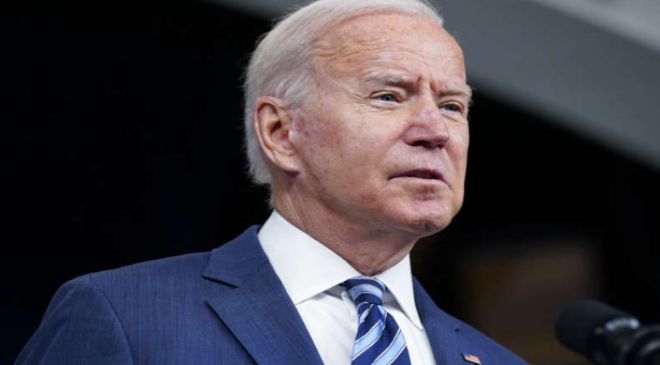LONDON — Hundreds of foreign leaders — among them President Biden, Canadian Prime Minister Justin Trudeau and New Zealand’s Jacinda Ardern — have arrived in London ahead of Queen Elizabeth II’s funeral on Monday.
Thousands of people lined up overnight in the chilly weather along the River Thames to pay their final respects to Britain’s longest-reigning monarch, as she lies in state at Westminster Hall. Her eight grandchildren — among them Princes William and Harry — briefly stood vigil at her coffin last night. President Biden is expected to pay his respects there Sunday before attending a reception hosted by King Charles III at Buckingham Palace this evening. Millions are expected to watch the funeral with crowds gathering near Westminster to secure a coveted spot as major disruption is expected throughout central London.
Here’s what to know
- A national minute of silence will be held across the U.K. at 8 p.m. local (3 p.m. ET) to encourage private reflection on the queen and her legacy.
- The state funeral is expected to be the U.K.’s biggest security detail post-WWII. Find out the details here.
- A royal surprise was in store for Britons lining up in “The Queue” this weekend as King Charles III and Prince William paid them an impromptu visit.
- Here’s how you can watch the queen’s funeral service Monday starting around 5:30 a.m. ET.

LONDON — In moving scenes, all eight grandchildren of Queen Elizabeth II and Prince Philip, stood in somber vigil in Westminster Hall late Saturday night. Led by heir-to-the-throne Prince William, the cousins followed him and his brother Prince Harry (both clad in military uniform) through the historic venue. They then filed around the coffin, which is sitting atop a catafalque podium, before taking up their positions and bowing their heads in reflection.
Prince Andrew’s two daughters Princesses Beatrice and Eugenie were present, along with the queen’s only daughter, Princess Anne and her children Zara Tindall and Peter Phillips. Prince Edward’s two teenage children Lady Louise and James, Viscount Severn, were also in attendance. Earlier this week, King Charles III led their parents, his three siblings, in a similar vigil.

The story of the day and hour of Elizabeth’s accession to the throne has been told many times, but it remains a captivating tale. It’s history with echoes of Arthurian romance.
On the morning of her father’s death, 25-year-old Elizabeth was perched in a treehouse in Kenya, from which she’d watched a herd of elephants led by matriarchs come to a watering hole. Too ill to travel, her father, King George VI, had tasked Elizabeth and her husband, Philip, with undertaking a months-long tour of the Commonwealth, in what was then the twilight of the British Empire. George saw his daughter off at London Airport on Jan. 31, 1952. It was the last time the two saw each other.

Camilla, the new queen consort, recalled her late mother-in-law’s “unforgettable” smile during a BBC video tribute. “She has been part of our lives forever,” she said of Queen Elizabeth II, who died at the age of 96. “She’s got those wonderful blue eyes, that when she smiles, they light up her whole face — I’ll always remember that smile.”
Camilla also praised the queen for the “difficult” task of being one of a handful of female leaders in a world dominated by men. “She carved her own role,” she added. The full prerecorded tribute will be aired nationally later on Sunday ahead of a moment of silence at 8 p.m. local time (3 p.m. Eastern time) across the United Kingdom.
4:03 AM: Why the crown won’t skip to Prince William, even if some people want it to

It’s a question that some people have been asking for years: Can the crown skip a generation to Prince William?
King Charles III has been monarch for just a week and a half. He has delivered well-received speeches, connected with crowds on his “walkabouts” and seen his approval ratings shoot up dramatically. There has also been more than one problem with a pen and small anti-monarchist protests, while #NotMyKing has been trending on social media. But overall, Charles has had a good start.
There’s no escaping, though, that he is not beloved like his mother, Queen Elizabeth II — admired even by those ambivalent about the monarchy. And so the question persists about whether it would be best to leapfrog over Charles and give the crown to his eldest son, William. “A lot of people wouldn’t mind skipping Charles,” said Lucy Eden, 26, who was with her family at a pub in south London.
3:34 AM: Closures for queen’s funeral bring disruption across U.K.
LONDON — The British government’s decision to declare Monday, Sept. 19, a public holiday for Queen Elizabeth II’s state funeral has led to a wave of closures, service disruptions and cancellations, including in essential industries such as transport and health care, and sparked a backlash among those with long-standing plans and appointments that day.
Hospitals have rescheduled nonurgent surgeries, funeral parlors have had to consult with the bereaved about delaying preparations and organizers of major sports, and cultural events have been forced to change their plans. The guidance from the government is to “allow individuals, businesses and other organisations to pay their respects to Her Majesty and commemorate Her reign, while marking the final day of the period of national mourning.”
There are typically eight so-called bank holidays per year in the United Kingdom, and businesses are used to working around them to maintain service, particularly because under British law businesses do not have to close on bank holidays and employees are not automatically entitled to the day off.
The last-minute decision to make Monday a holiday, coupled with the somber nature of the day, has left some employers scrambling as the government has encouraged them “to respond sensitively to requests from workers who wish to take time off” for what it called “a unique national moment.”
3:08 AM: Was Queen Elizabeth II a feminist?

Queen Elizabeth II was head of state and commander in chief of the British armed forces for more than seven decades. Her late husband gave up his career to support her and dutifully walked a few paces behind her in public. Her staff called her “The Boss.” Her face is on the money.
But was she a feminist, in word or deed?
As the world reflects upon her legacy after the death of Britain’s longest-serving monarch, the question is a matter of debate. The queen wasn’t known for making bold declarations about the rights of women — and some Britons held that against her. But others argue that she was a feminist icon all the same.
Elizabeth held fast to the custom that the head of Britain’s constitutional monarchy should not wade into politically tinged subjects. And so, regardless of her personal beliefs, she would have considered an active role in the women’s liberation or women’s equality movements off-limits.
And yet. Elizabeth became queen in 1952 — after a run of four male monarchs, and at a time when gender stereotypes portrayed women as homemakers. At the age of 25, she was suddenly the head of state and a symbol of a woman holding status and influence. She was reading government papers, meeting with prime ministers, entertaining world leaders — almost all of them men. She was a working mother who left her kids at home for work. After her coronation, she embarked on a six-month tour of the Commonwealth, leaving young Charles and Anne at home.
2:54 AM: The British love queues. The queen’s death brought one for the ages.

It is the queue to end all queues. The line to see Queen Elizabeth II lying in state stretched from Westminster Hall, across the River Thames and then onward, past the London Eye Ferris wheel and the Tate Modern museum and Tower Bridge. On Thursday evening, it reached as far as Southwark Park in Southeast London.
A government tracker on YouTube said Thursday night it was nearly 5 miles long. That was an underestimate, though. A government spokeswoman confirmed to The Washington Post that the distance measured was “as the crow flies” and didn’t include the labyrinthine zigzag section in the home stretch. On Friday, the queue had grown so long that the government said it would have to temporarily prevent new people from joining it.
But the mourners have been determined to pay their respects to their beloved monarch. If they have to wait eight hours? Ten hours? 24? They would prefer sooner rather than later, but they are fully committed. After all, forming a queue is what the British do. Americans like to call it a “line,” but that word doesn’t quite encompass the almost holy rule-bound nature the British have developed of waiting patiently behind someone to achieve a goal.
2:52 AM: With queen’s death, Commonwealth realms consider severing ties

When Prince Edward, the youngest son of Queen Elizabeth II, visited Antigua and Barbuda in April, the country’s prime minister told him that the nation, one of 15 in which the British monarch is head of state, wished to “one day” become a republic. After the queen’s death last week, Prime Minister Gaston Browne revealed a timeline: He plans to hold a referendum on casting off the monarchy “probably” within the next three years.
“This is not an act of hostility,” Browne told ITV News, but a “final step to complete the circle of independence.” The passing of Elizabeth, a unifying figure more beloved than her son, King Charles III, comes as several Commonwealth realms are reassessing their relationships with the crown.
Leaders across the Commonwealth, an association of 56 nations, most of them already republics, expressed sadness over the monarch’s death. But many of those countries, former outposts of the empire, have also been engaged in a public reckoning over the legacies of colonialism, including calls for atonement, reparations and independence.







































